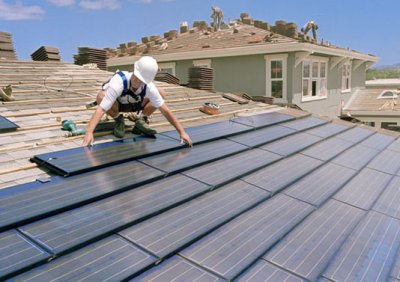small solar electric system installation and maintenance

Proper installation and maintenance of a small solar electric or photovoltaic (PV) system is essential for maximizing its energy performance. [Note: This article is written specifically to advise US consumers but its main points apply generally.]
Installation
When installing a PV system, important factors to consider are:
It is generally best to have a professional solar contractor install the system.
When choosing a contractor, the following questions should be asked:
Experience in installing grid-connected systems is valuable because some elements of the installation – particularly interconnection with the local utility – are unique to these systems. However, a competent company with off-grid PV experience should not be eliminated just because it has not yet installed grid-connected PV systems. Experience with off-grid systems is valuable too, because grid-independent systems are more technically complex than grid-tied systems.
A contractor who has been in business a long time probably understands how to work with customers and to compete effectively with other firms. Additionally, he/she will probably be aware of the latest code and permitting issues surrounding the installation of PV systems.
PV systems should be installed by an appropriately licensed contractor. This usually means that either the installer or a subcontractor has an electrical contractor's license. Your state electrical board can tell you whether a contractor has a valid electrician's license. Local building departments might also require that the installer have a general contractor's license. Call the city or county where you live for additional information on licensing. A solar rebate program may require that, in addition to being properly licensed, installers must demonstrate that they have special knowledge about installing PV systems. Special knowledge can be demonstrated through certification by solar industry and/or trade associations.
As with any project that requires a contractor, due diligence is recommended. Your state electrical board can tell you about any judgments or complaints against a state-licensed electrician. Consumers should call the city and county where they live for information on how to evaluate contractors. The Better Business Bureau is another source of information.
It is always a good idea to get more than one bid for the installation of your PV system. Make sure that all bids are made on the same basis. For example, a bid for a system mounted on the ground is usually very different from another bid for a rooftop system.
Similarly, some solar modules generate more electricity per square foot than others. Bids should clearly state the maximum generating capacity of the system – measured in watts (W) or kilowatts (kW). If possible, have the bids specify the system capacity in "AC watts" (alternating current) under a standard set of test conditions, or specify the output of the system at the inverter. Also request an estimate of the amount of energy that the system will produce on an annual basis (measured in kilowatt-hours).
Because the amount of energy depends on the amount of sunlight – which varies by location, season, and year to year – it's unlikely the contractor will quote a specific figure, but a range of 20% is realistic. Bids also should include the total cost of getting the PV system up and running, including hardware, installation, connection to the grid, permitting, sales tax, and warranty.
Your warranty is also a very important factor for evaluating bids. A solar rebate program may require that systems be covered by a two-year parts-and-labor written installation warranty, for example, in addition to any manufacturers' warranties on specific components (including inverter and module warranties). The installer may offer longer warranties. Also ask yourself, "Will this company stand behind the full-system warranty for the next two years?"
Maintenance
As with any mechanical or electrical appliance, PV systems require routine, periodic maintenance. System components may also need repair or replacement from time to time.
An efficient and long-lasting system will depend on a periodic check of system components and completion of any preventive maintenance as necessary. Talk with your system installer about routine and periodic maintenance. In the event of a system malfunction, effective troubleshooting and repair is necessary.
You may be able to carry out many routine inspections and maintenance tasks yourself. If, however, you are not the do-it-yourself type, or if there is a major problem with your system, you will need to locate a professional to do the work.
